Business
Reimagining the future of Sri Lanka’s apparel industry

By Shirendra Lawrence
The emergence of apparel and textiles as a significant contributor to Sri Lanka’s economy began post-Independence in 1948 when a few pioneering industrialists saw opportunities in its domestic market. Following the liberalization of the economy in the late 70’s, the industry ventured into exports, bringing in much needed foreign exchange, and before long, established Sri Lanka’s reputation as a manufacturer of quality products.
During the 90’s, facilitated by the 200 Garment Factories Program, manufacturing that had until then been located in free trade zones was expanded across Sri Lanka. This played a key role in the upliftment of the country’s rural economies.
The last decade has seen a further evolution, focused on end-to-end partnerships and complete customer solutions. However, an in-depth assessment of the sector’s strengths and competencies indicates that its full potential is yet to be realised.
With the pandemic causing significant disruption to Sri Lanka’s economy, our vision of elevating the country to a US$ 8 billion global apparel hub by 2025 is now perhaps more critical than ever. This growth is envisaged through value addition and further evolving from contracted apparel manufacturing for Buying Offices to end-to-end solutions for leading Global Brands and Retailers, spanning innovation to last-mile delivery.
With the pandemic gradually receding, apparel sector stakeholders have renewed collaborative efforts to achieve these goals.
Current status
In pre-pandemic 2019, the value of global apparel exports was estimated at $492 billion. Most would agree that with Sri Lanka’s contribution being just 1% of this, at $5.3 billion, the industry’s aspiration to grow it to $8 billion is not unreasonably ambitious.
Sri Lanka enjoys a reputation as a trusted partner within the supply chains of some of the world’s leading brands and retailers. The country’s apparel industry comprises a few large groups, supported by a strong ecosystem of Small and Medium Enterprises (SMEs). This is a symbiotic system; the larger players have developed meaningful Customer Partnerships, whilst the SMEs have created niches, including supporting the larger Groups to meet their supply chain requirements.
Despite its smaller scale and Sri Lanka’s apparel sector having relatively higher labour costs than some of its regional competitors, along with less preferential export market access, it has still progressed by leveraging other sources of competitive advantages. Sri Lanka ranks high in terms of reliability and product quality, which have elevated the country’s reputation and overall positioning. This is best reflected in the impressive list of global Brands and Retailers served by Sri Lankan manufacturers, including Victoria’s Secret, Marks & Spencer, Boss, NIKE, Calvin Klein, GAP, Levi’s, Ralph Lauren, lululemon, Calzedonia, Intimissimi and Tommy Hilfiger.
This elevated positioning also extends to talent attractiveness, with the country’s apparel sector appealing to the better professional talent, unlike some of our regional counterparts. A case in point is India, where professionals would often see other industries such as automobiles, electronics and IT as more attractive. Furthermore, the Island benefits from its strategic geographical location along major shipping routes as a regional logistics hub.
From an infrastructure standpoint, fabric manufacturers, who require process water, have established their factories within the BOI facilitated Free Trade Zones, which include advanced water treatment processes, whilst those in relatively labour-intensive apparel manufacturing have located themselves in rural areas across the country, providing direct and indirect employment to those communities, accelerating the development of those areas.
Leveraging on trade shifts
Whilst all of this progress has been well invested in, for the country to realise its apparel sector’s true potential, it is essential to fully leverage these strengths while understanding and aligning with the trade shifts that are taking place.
Studies indicate that the impact of increasing political and economic tensions between the Far East and the West will result in the movement of significant amounts of trade from China. Whilst these movements appeared to have commenced pre-pandemic, customers in western markets have delayed this process, not wanting to add additional dimensions of risk on top of pandemic-induced challenges. However, the shift is expected to gather momentum in 2022 and beyond.
Apart from direct business migration, opportunities would include potential FDI inflows from companies in the Far East seeking to augment their existing bases by establishing manufacturing locations in South Asia to mitigate their risk of losing customers. The industry and policymakers are mindful of potential opportunities that could arise as a result. The leadership of Sri Lankan apparel companies, with the support of the industry umbrella organisation, the Joint Apparel Association Forum (JAAF), and its constituent associations, including the Sri Lanka Apparel Exporters Association (SLAEA), are reimagining the sector’s future. These stakeholders are crafting strategic plans to facilitate the process of achieving the sector’s vision.
Maintaining competitive advantage
‘Doing the right thing’ has been the driving philosophy of Sri Lanka’s apparel industry, and this was key in attracting reputed Brands and private label retailers to Sri Lanka during the 80’s and 90’s. Marks & Spencer, in particular, saw Sri Lanka as a credible alternative for the migration of its western manufacturing bases at that time. This catalysed Sri Lankan manufacturers’ alignment with the expectations of the Ethical Trading Initiative (ETI), Worldwide Responsible Accredited Production (WRAP) and other organisations and standards focused on social responsibility and differentiated us from our competitors.
Moving to the present, what were competitive advantages have today become ‘hygiene factors’. Sri Lankan manufacturers have maintained their reputation for ethical manufacturing through environmentally responsible production, strong connections with existing and emerging organisations such as the Sustainable Apparel Coalition (SAC), and investments to reduce their Carbon Footprints. Significant strategic initiatives include the conversion of fossil-fuelled boilers to biomass and introducing other environmentally friendly energy sources such as solar. This also aligns the industry well with the Government’s efforts to increase renewable energy to 70% of Sri Lanka’s total requirement by 2030.
Sri Lankan apparel groups have also grown their businesses through geographic diversification. These efforts seek to minimise customer concerns of single country sourcing, leverage on bilateral and multilateral trade agreements and augment Asian manufacturing locations with a capacity closer to markets.
Improved trade access is vital
Greater preferential market access to existing and identified key export markets would substantially boost Sri Lanka’s apparel exports. However, it is vital to retain existing concessions under the EU and UK Generalized System of Preferences (GSP) Plus schemes while securing tariff reductions to other countries. Considering our success in penetrating key markets such as the USA, where tariffs for apparel exports are as much as, or in some cases even more than 30%, there is a significant opportunity to be had if the industry were provided with tariff waivers or even reductions.
Substantial opportunities also exist in large developing nations. Sri Lanka needs to increase its export quota of 8 million garment items per year to India, one of the fastest-growing regional economies. The Chinese market, too, presents vast potential.
Need for conducive policies
While recent initiatives to modernise trade facilitation, including the digitisation of customs clearance processes and administration of payments through online gateways, are welcomed, much more policy reform is needed. For example, if Sri Lanka is to evolve as an innovative apparel hub, a safe and conducive environment for innovation is required. This is only possible if Intellectual Property and data protection laws are given priority. Similarly, reforming colonial-era labour laws to reflect the very different world that we live in today is essential.
Favourable policies and incentives should be provided for investments related to backward integration and automation. The Eravur Fabric Processing Park is an important development in this regard, and the industry acknowledges the contributions of multiple state agencies in this initiative.
In conclusion, evolving Sri Lanka’s apparel industry will, without doubt, continue to bring benefits to the country – both directly and indirectly – increasing FDI, employment opportunities and export earnings whilst improving innovation and technology inflows.
With all stakeholders working in collaboration, the vision of making Sri Lanka a fully-fledged apparel hub is well within the country’s reach.
(Shirendra Lawrence is an apparel industry veteran and is the Deputy Chairman of the Sri Lanka Apparel Exporters’ Association. He is also an Executive Director of MAS Holdings. Shirendra holds a Mechanical Engineering (Honours) Degree from Imperial College, University of London, and is a Chartered Mechanical Engineer. He counts over 35 years of experience in manufacturing, business development and organisational leadership in the UK and Sri Lanka.)
Business
IMF staff team concludes visit to Sri Lanka
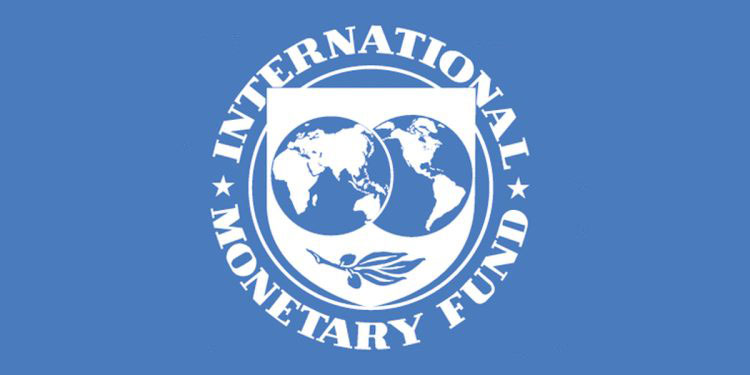
An International Monetary Fund (IMF) team led by Evan Papageorgiou visited Colombo from April 3 to 11, 2025. After constructive discussions in Colombo, Mr. Papageorgiou issued the following statement:
“Sri Lanka’s ambitious reform agenda supported by the IMF Extended Fund Facility (EFF) continues to deliver commendable outcomes. The post-crisis growth rebound of 5 percent in 2024 is impressive. Inflation declined considerably in recent quarters and has fallen to ‑2.6 percent at end-March 2025. Gross official reserves increased to US$6.5 billion at end-March 2025 with sizeable foreign exchange purchases by the central bank. Substantial fiscal reforms have strengthened public finances.
“The recent external shock and evolving developments are creating uncertainty for the Sri Lankan economy, which is still recovering from its own economic crisis. More time is needed to assess the impact of the global shock and how its implications for Sri Lanka can be addressed within the contours of its IMF-supported program.
“The government’s sustained commitment to program objectives is ensuring policy continuity and program implementation remains strong. Going forward, sustaining the reform momentum is critical to safeguard the hard-won gains of the program and put the economy on a path toward lasting macroeconomic stability and higher inclusive growth.
“Against increased global uncertainty, sustained revenue mobilization efforts and prudent budget execution in line with Budget 2025 are critical to preserve the limited fiscal space. Boosting tax compliance, including by reinstating an efficient and timely VAT refund mechanism, will help contribute to revenue gains without resorting to additional tax policy measures. Avoiding new tax exemptions will help reduce fiscal revenue leakages, corruption risks and build much needed fiscal buffers, including for social spending to support Sri Lanka’s most vulnerable. Restoring cost recovery in electricity pricing will help minimize fiscal risks arising from the electricity state-owned enterprise.
“The government has an important responsibility to protect the poor and vulnerable at this uncertain time. It is important to redouble efforts to improve targeting, adequacy, and coverage of social safety nets. Fiscal support needs to be well-targeted, time-bound, and within the existing budget envelope.
“While inflation remains low, continued monitoring is warranted to ensure sustained price stability and support macroeconomic stability. Against ongoing global uncertainty, it remains important to continue rebuilding external buffers through reserves accumulation.
“Discussions are ongoing, and the authorities are encouraged to continue to make progress on restoring cost-recovery electricity pricing, strengthening the tax exemptions framework, and other important structural reforms.
“The IMF team held meetings with His Excellency President and Finance Minister Anura Kumara Dissanayake, Honorable Prime Minister Dr. Harini Amarasuriya ; Honorable Labor Minister and Deputy Minister of Economic Development Prof. Anil Jayantha Fernando, Honorable Deputy Minister of Finance and Planning Dr. Harshana Suriyapperuma, Central Bank of Sri Lanka Governor Dr. P. Nandalal Weerasinghe, Secretary to the Treasury Mr. K M Mahinda Siriwardana, Senior Economic Advisor to the President Duminda Hulangamuwa, and other senior government and CBSL officials. The team also met with parliamentarians, representatives from the private sector, civil society organizations, and development partners.
“We would like to thank the authorities for the excellent collaboration during the mission. Discussions are continuing with the goal of reaching staff-level agreement in the near term to pave the way for the timely completion of the fourth review. We reaffirm our commitment to support Sri Lanka at this uncertain time.”
Business
ComBank unveils new Corporate Branch at Head Office
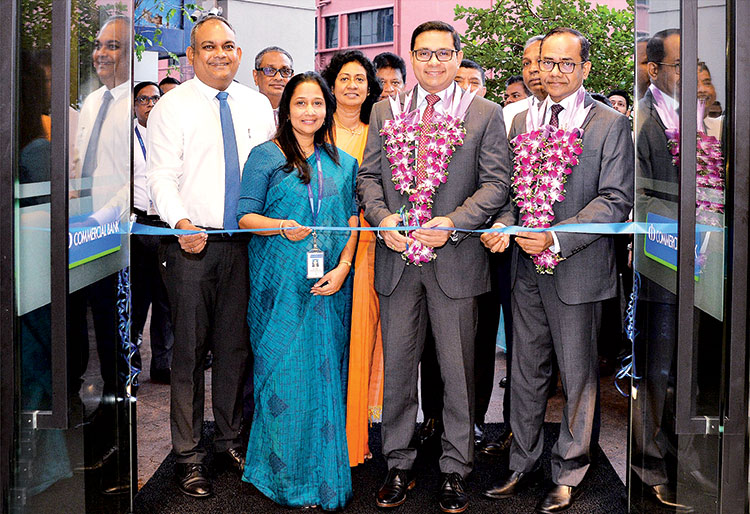
The Commercial Bank of Ceylon has transformed its iconic ‘Foreign Branch’ into the ‘Corporate Branch,’ reaffirming its commitment to delivering dedicated, comprehensive financial solutions to corporate and trade customers.
The Bank said this transformation represents a new milestone in its illustrious journey, and resonates with the rich commercial heritage of Colombo, a city that has long served as a vital trading hub in the region.
Strategically located at the Bank’s Head Office at Commercial House, 21, Sir Razeek Fareed Mawatha (Bristol Street), Colombo 1, this rebranded Corporate Branch stands as a first of its kind in Sri Lanka —a premier financial hub tailored exclusively to the needs of corporate customers, the Bank said. The transformation aligns with the Bank’s vision of providing unparalleled service excellence, bespoke financial solutions, and fostering long-term business partnerships.
Commenting on this strategic initiative, Commercial Bank’s Managing Director/CEO Sanath Manatunge stated: “It is our aspiration that just as the historic Delft Gateway, at which our Head Office is located, once opened the path to the Dutch Fort, our Corporate Branch will chart a new era of enduring and prosperous business collaborations, that will extend beyond Sri Lanka’s shores.”
Business
Fits Retail and Abans PLC Unveil Exclusive DeLonghi Premium Coffee Experience
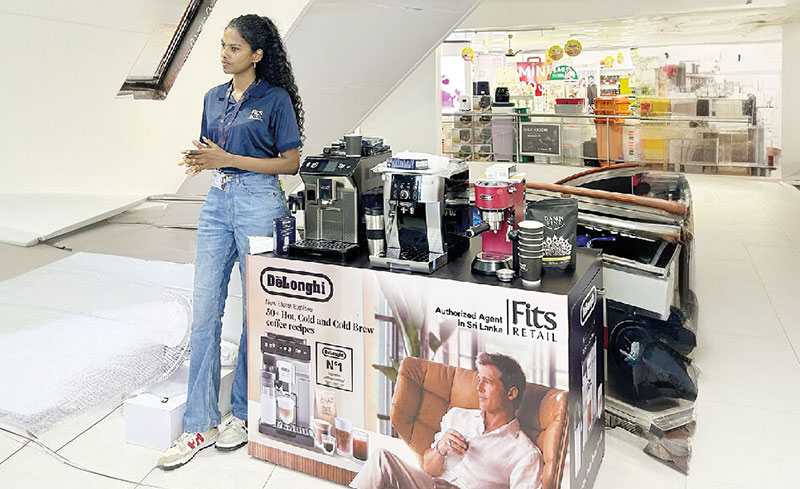
Fits Retail has partnered with retail giant Abans PLC to showcase the iconic DeLonghi coffee machines at two of Colombo’s most prestigious locations: Abans Elite Colombo 3 and Abans Havelock City Mall showrooms.
At these dedicated demonstration zones, visitors can discover the unparalleled precision engineering and user-friendly technology that have made DeLonghi machines the preferred choice for discerning coffee lovers in more than 46 countries worldwide. Renowned for consistently delivering café-quality espresso, cappuccino, and even specialty cold brews, DeLonghi machines exemplify Italian innovation at its finest.
Yasas Kodituwakku, CEO of Fits Retail, expressed excitement about the collaboration: “This partnership represents our unwavering commitment to bringing global coffee excellence to Sri Lankan connoisseurs. With Abans PLC, we’re creating more than just demonstration spaces; we’re curating premium destinations for an authentic coffee experience.”
“As pioneers of premium lifestyle experiences in Sri Lanka, our collaboration with Fits Retail aligns seamlessly with our vision of elevating everyday moments into exceptional experiences,” said Tanaz Pestonjee, Director Business Development at Abans PLC.
-

 News4 days ago
News4 days agoSuspect injured in police shooting hospitalised
-

 Features5 days ago
Features5 days agoRobbers and Wreckers
-

 Business4 days ago
Business4 days agoSanjiv Hulugalle appointed CEO and General Manager of Cinnamon Life at City of Dreams Sri Lanka
-

 Business5 days ago
Business5 days agoBhathiya Bulumulla – The Man I Knew
-

 Business6 days ago
Business6 days agoNational Anti-Corruption Action Plan launched with focus on economic recovery
-

 Features3 days ago
Features3 days agoLiberation Day tariffs chaos could cause permanent damage to US economy, amid global tensions
-
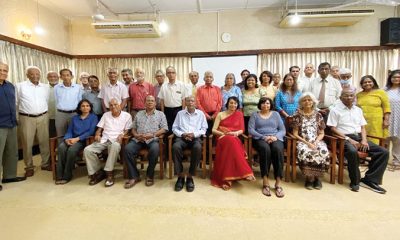
 Features3 days ago
Features3 days agoMinds and Memories picturing 65 years of Sri Lankan Politics and Society
-
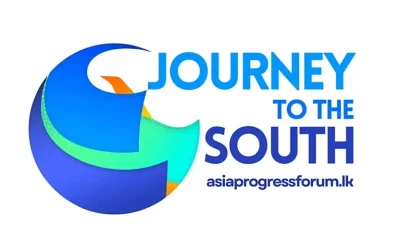
 Opinion6 days ago
Opinion6 days agoSome aspects of China’s development model











